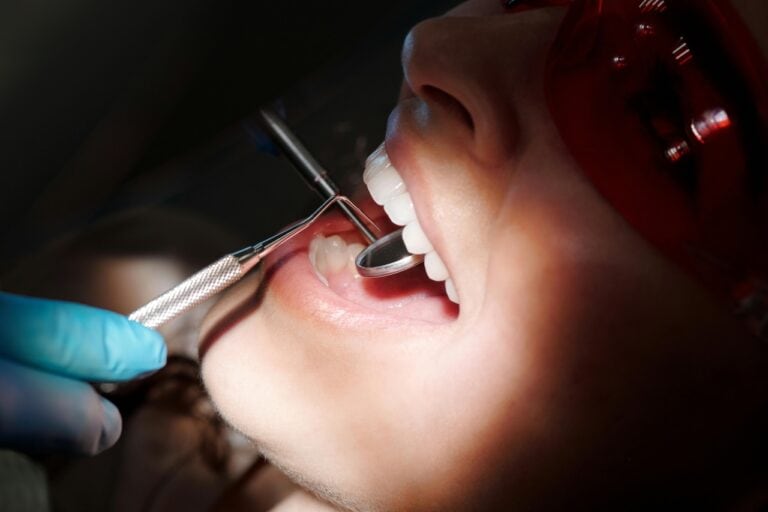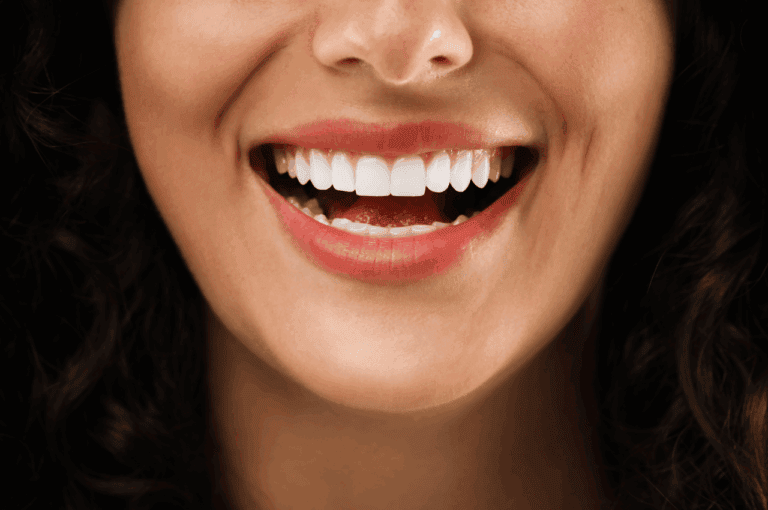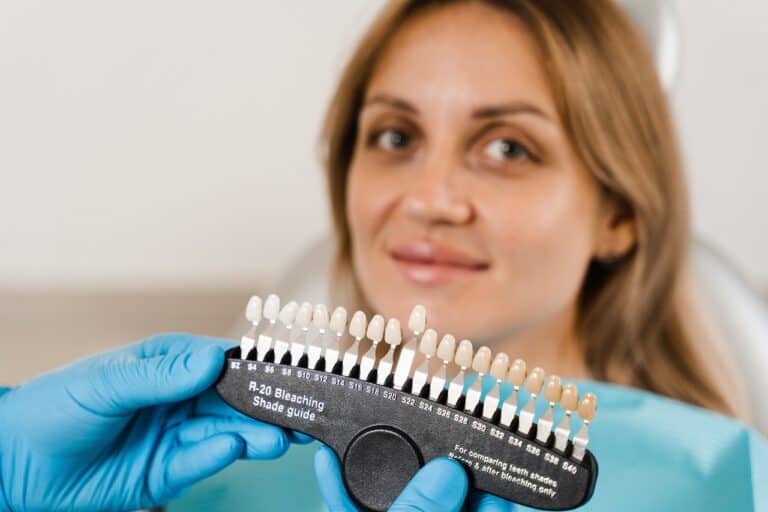If you’re contemplating a whiter, more uniform smile, you must be curious about how long veneers really last. A lot of our patients at Long Island Veneers want to know what sort of time commitment they’re making before they begin.
The great news is that if you take care of your veneers, they can be a trusted companion for years to com. Let’s dive into what impacts their longevity and what to anticipate as a patient.
Veneer Lifespan
Veneers provide a dependable path towards an enhanced smile, but their longevity rests on a couple of key considerations. Knowing a little about the lifespan of veneers can help you make informed decisions about caring for your smile.
Porcelain vs. Composite Veneers
Porcelain veneers typically have a lifespan of 10 to 15 years. Many of my patients here on Long Island get their porcelain veneers to last as long as 12 years, sometimes even longer with great care.
Composite veneers don’t last as long. Most require replacement in 4 to 8 years. This distinction exists because of the materials involved and how each reacts to everyday wear.
Why Material Choice Matters
Materials will directly affect the lifespan of your veneers. Porcelain is known for its strength, stain-resistance and lifelike appearance. Composite is less expensive up front but chips or stains faster.
- Porcelain veneers: Last up to 10–15 years, and sometimes, with careful brushing and regular dental visits, up to 15 or even 20 years.
- Composite veneers: Typically last 4–8 years and are more likely to need earlier replacement due to chips or discoloration.
Selecting the appropriate material is a compromise between cost, aesthetics, and the desired longevity of your results. Just be sure to discuss your lifestyle and expectations with your dentist.
Importance of Care and Maintenance
With proper care, you can get the most lifespan out of your veneers. Maintaining good oral hygiene habits means regular brushing, flossing and avoiding biting into hard foods, which prevent the chips or breaks.
Your daily habits count. If you’re a chronic teeth grinder or nail biter, your veneers could wear down quicker. Most of our patients at our Long Island practice are surprised by how much these simple habits impact longevity.
Regular dental visits will catch any minor annoyances before they turn into full-blown disasters. Timely care can prolong the lives of porcelain and composite veneers alike.
Eventual Replacement Is Unavoidable
No veneer lasts forever. Replacement is inevitable eventually. Even with great care, wear and tear happens.
When it’s time for them to be replaced, veneers can chip, become loose or lose its luster.
You’ll want to budget for eventual replacement to maintain your grin’s prime status.

Influencing Factors
The longevity of veneers is dependent on a number of factors that occur pre- and post-placement. These are materials selected, your dentist’s expertise and your daily tooth care.
Key factors influencing veneer longevity:
- Material type: Porcelain veneers usually last longer and resist stains better than composite ones. Composite veneers, which are less expensive but chip/wear out earlier.
- Quality of fabrication: High-quality materials from reputable labs can make a real difference in how long veneers remain intact and looking natural.
- Dentist’s skill: Proper placement and bonding by a skilled dentist matters. Properly fitted veneers aren’t as likely to come loose or irritate.
- Oral hygiene: Daily brushing, flossing, and regular dental checkups are crucial. Bad oral habits can cause decay around the edges of the veneers, reducing their longevity.
- Biting forces: Chewing on hard objects or grinding your teeth puts extra stress on veneers, causing cracks or even complete failure.
- Lifestyle choices: Smoking and frequent coffee drinking can stain even porcelain veneers over time. Acids in foods and beverages erode the bonding material as well.
- Gum health: Healthy gums support veneers. Gum disease can expose the edges and make them prone to lift-off.
All of these factors mix differently for every patient. Some of our friends on Long Island just have bad habits or lifestyles that make them extra careful with their veneers. For instance, night grinders should invest in a night guard to minimize pressure on their veneers. Others will need to reduce acidic beverages or smoking if they want their veneers to remain their most attractive.
What matters most is daily upkeep. If you skip brushing or flossing, you’re more prone to decay, which can not only affect the veneer, but the underlying tooth as well. Going to your dentist twice a year helps identify early problems, allowing you to tackle small issues before they become big setbacks.
Lifestyle factors accumulate. Daily smoking or coffee will gradually rust even the finest veneers. Minimize these habits, or at least rinse your mouth out with water afterward, and you’re safeguarding your investment. By opting for low-acidic snacks and drinks, you’re giving the bonding agent a vacation, yet again minimizing any possible abrasion.
Permanence Explained
Veneers provide a means to enhance your smile, but they are not a permanent fix. Although they’re built to last, both the materials and the placement process indicate that all veneers will ultimately need to be replaced or repaired. Knowing what “permanence” entails in this context can assist you in establishing reasonable expectations for your cosmetic dental investment.
Veneers Are Not Permanent
Porcelain or composite veneers will not last a lifetime. They adhere to your real teeth with powerful glues, but they slowly grind down from daily wear as well as the foods and beverages they encounter. For instance, composite veneers can last around 4-8 years. Porcelain veneers, which are the more durable option, typically last 10-15 years or more for individuals.
No matter how well you care for them, every veneer will chip or stain over time. Tiny chips, cracks or worn edges indicate when it’s time to fix or replace. This is not a failure of the veneers, but to be expected in their life cycle.
Irreversible Tooth Preparation
In order for veneers to fit, a small amount of the enamel needs to be shaved off of each tooth. That’s the point of no return. Once enamel is lost, it can’t regrow, and the tooth will forever after require coverage by a veneer or some other restoration.
This is what makes veneers such a serious commitment. Since it alters your natural teeth forever, you will have to account for replacements down the road, if you’re here in Long Island or anywhere else in the US.
Longevity and Durability
While veneers are very long lasting for most patients, they are not permanent. Lifestyle and care have a lot to do with longevity. Good oral hygiene, regular dental visits, and steering clear of hard foods or biting nails will help extend their lifespan. For instance, wearing a mouthguard at night can shield you from grinding harm.
Maintenance Tips
Veneers are durable and can last for years but their lifespan depends on your care. Sticking to a few good habits makes all the difference for Long Islanders and everyone else.
- Brush twice daily: Use a soft-bristled toothbrush and non-abrasive toothpaste to avoid scratching the surface. Brushing after EVERY meal, if at all possible, helps stave off stains and maintains your veneers.
- Floss every day: Daily flossing helps remove plaque from between teeth and around veneers. Doing so not only prevents gum disease but safeguards the bond anchoring your veneers.
- Use antibacterial mouthwash: Rinsing with an alcohol-free antibacterial mouthwash can lower the risk of decay and gum disease. This is particularly true if you’re susceptible to gum problems.
- Schedule regular dental visits: See your dentist at least twice a year for checkups and professional cleanings. These visits assist in catching any issues early and maintaining the good looks of your veneers.
- Eat carefully: Avoid biting into very hard foods, like ice or hard candy, which can chip or dislodge veneers. Sticky foods, like caramel, can tug at the edges and compromise the adhesion.
- Protect your veneers: If you grind your teeth at night, ask about a night guard or retainer. This can stave off undue strain that could fracture or dislodge veneers.
- Avoid tobacco: Smoking or using other tobacco products can stain veneers and increase the risk of gum disease. Avoiding tobacco will preserve your veneers’ longevity and aesthetic.
Keeping to these habits makes a distinct difference. Almost everyone can easily incorporate these tips into their daily regimen, and each goes a long way toward defending not only your veneers but your natural teeth as well.

Recognizing Issues
Knowing how to recognize early issues with dental veneers can keep your smile intact and prevent more severe issues in the future.
Common Symptoms to Watch
It’s clever to be on the lookout for specific indicators that your veneers require care. Here are the main symptoms to keep an eye on:
- Persistent sensitivity or discomfort: If you notice aching or sharp sensations that don’t go away, it could signal an underlying problem with the veneer or the tooth beneath it.
- Chipping or cracking: Even small chips or cracks can weaken veneers. This might need immediate fixing or swapping out to maintain your dental defense.
- Discoloration or staining: Unlike natural teeth, veneers don’t respond to whitening treatments. If they begin to appear dingy, yellow or stained, they might require expert inspection.
- Gaps at the gumline: If you see spaces forming between the veneer and your gum, this could mean the fit has changed and you might need an adjustment.
- Noticeable changes in appearance: Shifts in the shape, alignment, or color of the veneers over time can be a warning sign that they are nearing the end of their lifespan.
Taking a checklist of these symptoms can assist you in monitoring changes at home. This keeps you proactive and assists your dentist at checkups.
When to Seek Professional Advice
Lingering pain, particularly after consuming hot or cold food and beverages, should not be overlooked. Sometimes, it indicates more than everyday wear and tear.
Even the best veneers for five years may begin to develop subtle changes after ten. You could notice minor color changes or small chips that are easy to overlook initially. On Long Island, we all go to the dentist on a regular basis so your dentist can identify these issues early and recommend if it’s time to replace.
If your veneers are 10+ years old, exposed damage or gaps could indicate that both your veneers and natural teeth have shifted. It’s not uncommon for patients to require complete replacement anywhere from 10 to 15 years.
Unique Insights
Veneers are a significant smile investment, so knowing how long they last and what affects their success is important. New materials and techniques are helping veneers last even longer, but the specifics count, particularly for Long Island patients seeking a natural, low-maintenance result.
Advances in Dental Technology
Better adhesives, better ceramics are extending veneer lifespans. Contemporary E-Max veneers are particularly prized for their durability and natural appearance. They mix in perfectly with natural teeth and retain their color for years. That’s for those who want a smile that stands up even with day-to-day grind.
This two-visit process for porcelain veneers guarantees an accurate fit. New digital imaging and state-of-the-art lab techniques allow dentists to tailor veneers to your individual smile. Thanks to these advances, you’re left with a seamless, comfortable outcome that appears and feels natural.
Bite Alignment and Jaw Habits
Your bite and jaw habits are a huge factor in veneer success. If you grind your teeth, or have a bad bite, veneers can wear down quicker. A mouthguard at night or during sports helps protect your investment. Steering clear of chewing on hard objects like ice or pens counts as well.
Just as regular brushing, flossing, and checkups prolong dental health, so too do these habits maintain veneer life. Even minor adjustments, such as choosing a non-abrasive toothpaste, can help. These habits keep your smile shining!
Making the Most of Your Veneers on Long Island
Veneers are a dependable way to a beautiful smile, generally ranging from 10 to as many as 15 years. Here in Long Island, your local diet, lifestyle, and dentist visits all determine how long your veneers will last. Maintaining good oral hygiene and protecting your veneers from hard foods or teeth grinding will help.
If you’re thinking about veneers or are curious about what to expect in our neck of the woods, the folks at Long Island Veneers are here to steer you in the right direction. Contact us to set up a consultation, and we’ll figure out what’s best for your smile and your needs.






